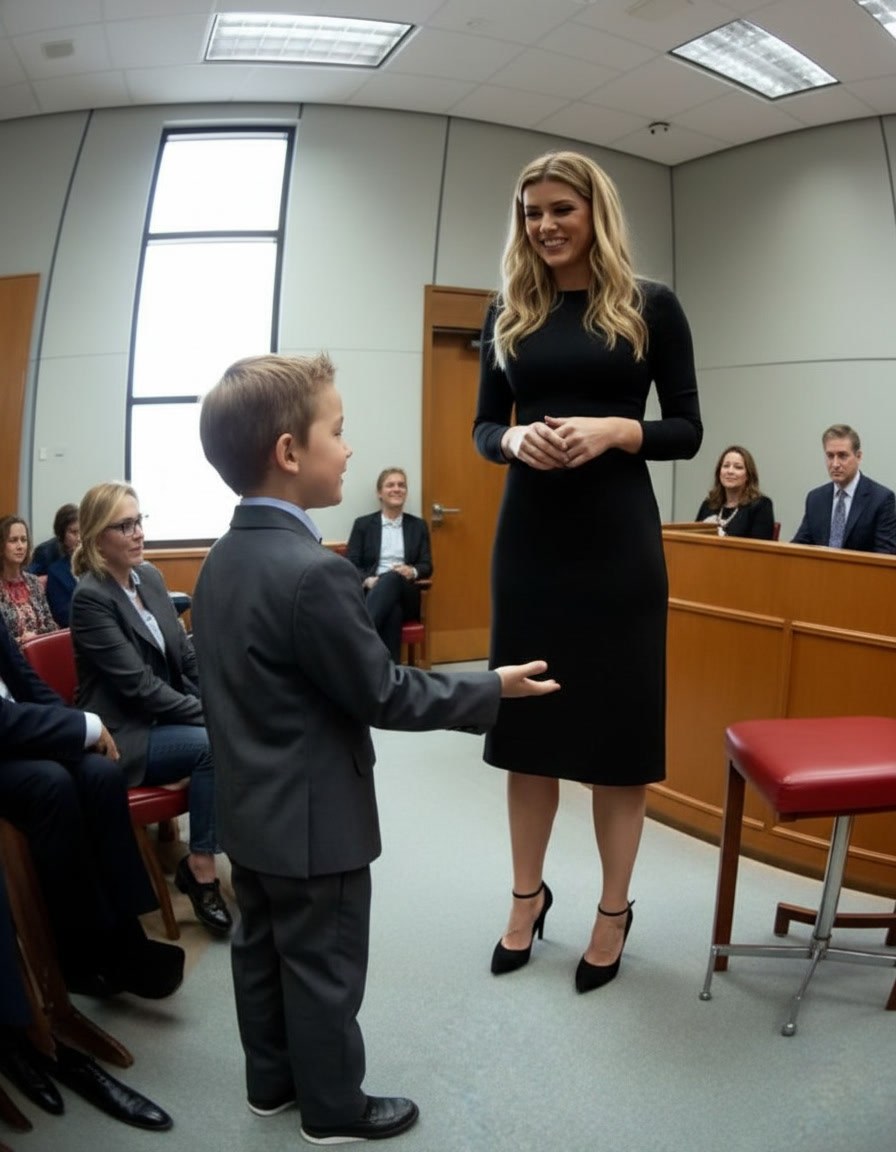The courtroom felt different that morning—too still, too quiet, like everyone inside was holding their breath without realizing it. Even the scrape of a chair sounded sharp, slicing through the tension. Custody hearings were never gentle, but that day carried a weight that settled on your shoulders and refused to let go.
My ex stood beside his attorney, chin lifted, radiating certainty. He insisted that our eight-year-old son wanted to live with him, saying it with the confidence of someone delivering a predetermined truth. The judge listened, expression unreadable, then turned to Zaden.
My son—my sweet, serious, thoughtful boy—sat on the bench, small legs dangling, hands folded too neatly in his lap. He was trying to hold himself like an adult, but everything about him reminded me he was still just a child facing something far too heavy. Still, he lifted his chin slightly when the judge asked if he wanted to speak.
And that’s when he asked the question that shifted everything.
“Can I play something?” he asked quietly. Not defiant. Not scared. Just steady.
The judge studied him carefully, then nodded. “Yes, Zaden. You may.”
My ex straightened, convinced that whatever Zaden had recorded would support him. He shot me a look that suggested victory was already in his hands. But I was watching Zaden—not him. What I saw wasn’t anger. It wasn’t fear. It wasn’t a child picking a side.
It was truth, gathering courage.
Zaden pulled out his phone, hands trembling only slightly—the same tremble he got before spelling bees, school plays, or when he needed to say something important. He tapped the screen, took a deep breath, and held the phone up.
The recording began.
His small voice filled the courtroom—clear, soft, heartbreakingly honest.
He explained that the night before, he had thought about all the adults talking: where he wanted to live, what he wanted, and how impossible it felt to say it aloud without hurting someone. So he recorded himself. He wanted to “say it the right way,” without forgetting anything or getting too nervous.
He spoke about school, friends, and routines. About the comfort he felt in the home he already knew. About quiet mornings with me, the predictability that helped him sleep, and a sense of security he couldn’t fully describe but clearly understood.
Not once did he attack his father.
Not once did he bring up arguments or resentment.
He simply said he needed stability. Staying where he currently lived made him feel steady, supported, and safe.
When the recording ended, the courtroom stayed silent long after his voice faded. The judge’s expression softened—genuine, moved, almost paternal for a moment.
“Thank you, Zaden,” he said warmly. “That took courage.”
Across the room, my ex shifted in his seat. His earlier confidence had cracked. He looked stunned—not angry, just blindsided by the realization that his son’s wishes didn’t match the narrative he had constructed.
The judge excused Zaden with a kind smile, letting him step down while the adults continued. But the truth had already shifted the case—not through strategy or argument, but because an eight-year-old boy had found the strength to speak for himself honestly, simply, and without malice.
The ruling that followed wasn’t dramatic or harsh. It wasn’t a victory for one side or punishment for the other. It was straightforward, based on what the judge called “the best interest of a child who communicated his needs with admirable clarity.”
When we left the courthouse, the autumn air felt like release. People moved around us—lawyers, families, strangers wrapped up in their own battles—but in that moment, none of it mattered.
Zaden slipped his hand into mine.
Not clinging. Not scared. Just connecting.
I looked down at him. He gave me a tiny, tired smile. No triumphant grin. No relief-laced tears. Just quiet resolution. His bravery didn’t come from wanting to win—it came from wanting peace.
In that small gesture, his hand fitting into mine like a truth finally settling where it belonged, I realized something I’ll never forget: children understand far more than adults give them credit for. They see the emotional currents before we name them. They feel instability before we address it. And sometimes, when adults complicate everything, a child becomes the one who speaks the simplest version of the truth.
Zaden didn’t change the outcome by choosing a side. He changed it by speaking from the heart—without agenda, bitterness, or trying to please anyone.
His courage reminded me that honesty doesn’t need volume to be powerful. Sometimes the softest voice in the room carries the sharpest clarity.
Walking out of the courthouse, hand in hand with my son, I knew something had shifted forever. Not just legally. Not just practically. But in the way I saw him, in the way I understood his resilience, and in the way he understood his own voice.
He was only eight.
But that day, he taught every adult in the room something about truth.
